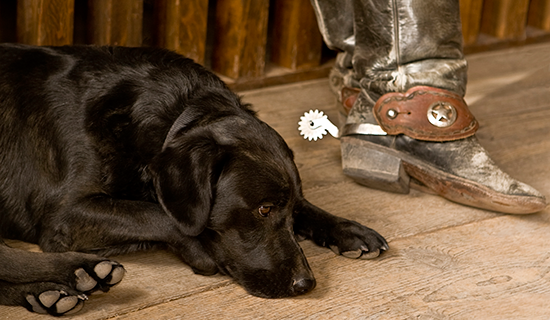
February-
March 2016
More Than Money
------------------
|






Settling an Estate May Take Dogs, Cowboys, and Lawyers
By Bill and Brenda Evans
Brenda Bunch’s father died three years ago—suddenly and unexpectedly of a ruptured abdominal aortic aneurysm. He was at ease with the Lord, prepared, and ready to meet him. He loved his two daughters, Brenda and Sandy and their families, and his good Christian wife who had died four years earlier. He was prepared. Mr. Selvey had even made arrangements ahead of time for the funeral, casket, clothing, and burial site.
In fact, he made every arrangement, except one. After the funeral, Brenda and her sister Sandy found his will in a safe-deposit box, clearly written but never notarized. Legally, their good father was unprepared for death.
Brenda Bunch and her husband Stan recently talked with us about the quandaries their family fell into after her father’s death. None were what her father ever intended. Making his plans legal would have changed so much.
Brenda and Stan were not unacquainted with trials. But the problem of settling her father’s estate was different from the up and down of ministry during 29 years as missionaries in Panama or in their roles now as teacher (Brenda) and executive director (Stan) of Missouri Free Will Baptists. Of course, it is harder to see through tears.
Brenda’s father was a farmer in southwest Missouri, mostly cattle and hay. He owned 320 acres of land, tractors, balers, rakes, brush hogs, cattle, farm buildings, and a home. Right away, Brenda and her sister Sandy engaged a lawyer who said, “This will be easy. You girls get along well.
There’s no debt and no contestants. We’ll be settled in six months.” The lawyer became the executor, and they became evaluators of their father’s assets. They were to get back to him a little later.
The lawyer was right about one thing. There were no family quarrels. Brenda and Sandy decided to divide up duties. The two of them would prioritize and organize, because Sandy was especially good at that. Stan would do the phone work, and Allen, Sandy’s husband, would research and set a selling price for the farm equipment. The plan worked well. “It drew us together. I joked with Brenda and Sandy that they had become plantation owners, and Allen and I were their workers, but it worked. Still does. Allen and I are best friends now,” Stan said with a grin.
But their teamwork was certainly tested. Mr. Selvey had 60 acres committed to a five-year renewable Conservation Reserve Program administered by USDA. Uncle Sam’s white-collar hirelings weren’t always easy to deal with; in fact, they were sometimes downright “frustrating,” to use Stan’s word. They found life insurance policies from the ’60s and ’70s but had inadequate documentation, “a nightmare to wade through,” Brenda said. And at first, they weren’t sure what they would do about a partnership Mr. Selvey had in his hay business, but the other farmer wanted to stay. So, they drew up an agreement: he bought Mr. Selvey’s hay equipment, leases the haying acreage, maintains fences, and has storage access to the farm buildings. According to the agreement, the family is responsible for insurance and taxes.

Then there were the cattle to round up and sell. Mr. Selvey’s herd of four-legged walking steaks had a reputation, especially the alpha bull, an 1,800-pound Limousin that had sometimes chased Mr. Selvey under his tractor. The Limousin also was known to jump cattle chutes and walk on the backs of his female counterparts to escape. The auction yard at Fort Scott, Kansas, had told Mr. Selvey not to bring any more of his stock there to sell. They were too wild.
Brenda and the others hired professional cowboys for a roundup. Promptly on roundup morning, four men and one woman rolled out of their pickups with boots, spurs, lassoes, ten horses, 15 cattle dogs, and five horse trailers. They ran the big Limousin until he was winded, tightened the lasso around his neck, and got him in the trailer. A younger bull jumped a five-foot stall, but a pit bull snagged him in the lips and held on until the cowboys got him roped and tied up rodeo-style.
After everything in sight had been rounded up, the cattle dogs were sent out into brush piles and draws and rousted out 20 more cows to load onto trailers headed for the cattle auction in Joplin, Missouri. The cowboys were expensive but worth every penny. The cattle—even that full-of-himself Limousin—sold at a premier price.
Brenda and Stan talked about other things they learned from the process as well. Unlike the prompt and efficient cowboys, the lawyer turned out, by his own admission, to be slow as molasses in winter. The settlement took three times as long as he promised. A year into the proceedings, Stan asked what they needed to do to speed things along. “You all don’t need to do a thing, but your lawyer does,” the lawyer admitted. A riding accident and a love for deer hunting, among other things, covered up the stack of Selvey estate documents on his desk. Settling an estate often takes more time than you think or want.
Flies get in the ointment, too. One is upkeep on the property in the meantime or repairs if you are going to sell. Stan manned the brush hog and tore down a worse-for-wear hog barn with floors made of old railroad tracks. Eventually, he and some helpers pulled out 70 tons of old steel rail, a big fly in anybody’s ointment.
Other things are left as is. Brenda and Sandy have kept the house. Their mother’s quilting stuff is still there. Once a month or so, they set up the quilting frame, talk and tack, and stitch their lives together tighter and tighter. In the summer, their children and grandchildren come also. Surprising to some who settle family estates for the first time is how the emotional value of things often outrank the monetary value—what to keep, what to let go. Always a dilemma. Again and again, for many, love trumps money.
In addition to these boots-on-the-ground learning experiences, Brenda and Stan share some advice for settling an estate the right way:
Don’t put off legally preparing for your death, whatever your age. Take action. Mr. Selvey began; he made a will, but got stalled. No one wanted to seem pushy, so no one urged him on. Now, Brenda wonders whether her father was waiting for them to remind him, to suggest notarization, for example. Stan, too, wonders. “I’m his son-in-law, and I wish I’d said more, taken the lead.”
Somebody needs to, has to. And somebody will, eventually, before death or after, as Brenda and Stan learned, but with greater difficulty, worry, and delay.
Along the way, the Bunches have gathered other tidbits, such as properly evaluating property, especially real estate, because to undervalue it now may create a tax burden later. Also, do an annual net worth statement the first of each year to assess your financial progress. Organize legal documents and make sure your heirs know where they are.
Use Free Will Baptist Foundation, the Bunches also recommend. They are in the process of finishing their own plans: a Living Trust, a will, power-of-attorney, living will, and other end-of-life plans. “David Brown and the Cornerstone consultants are great,” Stan said.
Above all, Stan says, “Just get your stuff done and in order. Trust someone now, or you will have to trust someone else after you die. That’ll be much harder.”
About the Writers: Bill Evans, former director of the Free Will Baptist Foundation, lives in Ashland, Kentucky,
with his wife Brenda, a retired English teacher. They are proud grandparents of seven. |
|

